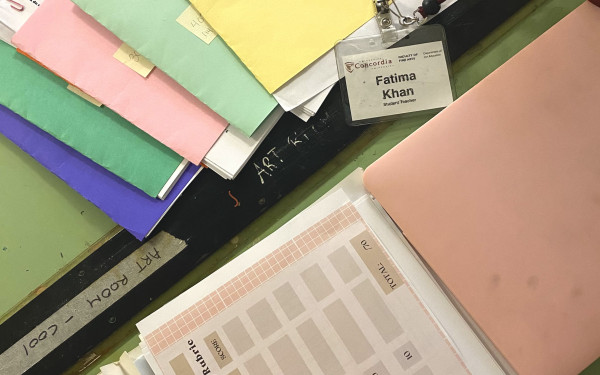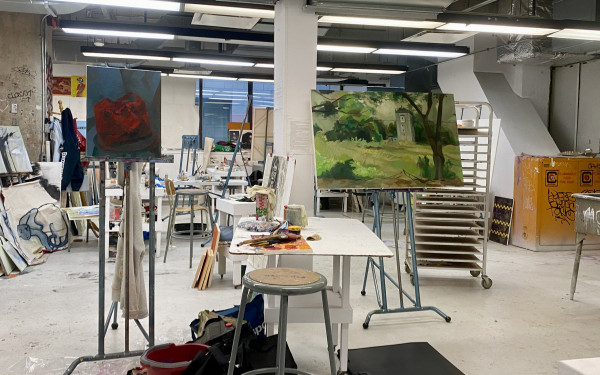How Quebec’s Culture of Islamophobia is Seeping Into Public Schools
Muslim Students Feel Increasingly Unsafe in Primary and Secondary Schools
Ayeza Hussain is a 16-year-old Pakistani student from Antoine-Brossard High School in Brossard, Que. Though she finds her student body diverse, it has not stopped her from facing Islamophobic violence in school.
During a lunch period, a white Québecois student approached her and began harassing her. “He threw his lunchbox at me and screamed ‘Allahu Akbar,’” Hussain recalled.
She could not believe the assault was committed against her.
“I was so shocked, my school is very ethnically diverse, there are a lot of different religions and cultures,” Hussain said. “There is even a prayer room. A lot of Muslims go there and we have Muslim teachers at our school.”
Diversity and community were not enough for her to avoid experiencing direct Islamophobia for the first time in her life.
For years, there has been an increase in Islamophobia in schools across Quebec. Research finds the province is growing increasingly hostile towards Muslims, making it harder for people of faith to freely express themselves without the fear of harassment.
Combined with the Coalition Avenir Québec’s anti-religion policies in schools implemented in the name of secularism, Muslim students are scared of being harassed. Students and teachers alike are calling for action to be taken.
In Quebec, Muslims are regarded as one of the most stigmatized religious groups.
Laws such as Bill 21, also known as laïcité or Quebec's secularism bill, deny Quebec citizens from wearing religious symbols such as the hijab, kippah, the dastar and the cross in academic, government and law enforcement positions, further stigmatizing religious minorities and inhibiting the path to fighting against discrimination.
In the 46th Session of the Human Rights Council on November 2020, the working definition of Islamophobia consisted of the following: “A fear, prejudice and hatred of Muslims or non-Muslim individuals that lead to provocation, hostility and intolerance utilizing threatening, harassment, abuse, incitement and intimidation of Muslims and non-Muslims, both in the online and offline world. Motivated by institutional, ideological, political and religious hostility that transcends into structural and cultural racism which targets the symbols and markers of being a Muslim.”
In the years following the 9/11 terror attacks, there has been a notable increase in hate crimes, racialization, mistrust, and prejudice toward Muslims around the world, including in Canada. Researchers have found that 69 per cent of Quebecers hold a negative judgment about Islam.
After 9/11 in Quebec, stereotypes of Muslims have influenced secularism and media discourses. Identity politics, merged with secularist discussion, have portrayed Muslims as a threat outside the “nationalist space” in aiming to preserve Quebec sovereignty.
Karishma Kheterpal, a elementary school teacher in Brossard, Que., shared her experiences witnessing Islamophobia.
She recalled when a Muslim student teacher left a classroom and went outside the door to pray. One of her colleagues then made disparaging comments towards her, Kheterpal said.
Noticing the comments, she questioned the teacher’s racism and prejudice.
“But, what would [the student teacher] have done if she was teaching and it was her time to pray?” said Kheterpal.
However, she said the situation was handled appropriately and soon after, a prayer room was set up in the school.
Although Kheterpal's school does not support Bill 21, no strategy has been implemented to address Islamophobia.
Saeed Khan is a Muslim high school teacher who works in St-Jean-sur-Richelieu. In terms of combatting racism and Islamophobia, he feels that his school has been inadequate.
“The school is supposed to be doing something to combat it, not ignore it until it goes away, and I feel like that happens too much,” expressed Khan.
Teachers are raising concerns about the further secularization of the primary and secondary curriculums, which could increase the alienation and ostracization of marginalized religious communities.
An example of this is the course Ethics and Religious Culture (ERC), being removed from primary and secondary schools province-wide. Instead, the government has opted to teach a class called Culture and Citizenship in Québec.
The process began in January 2020 and will be implemented in the 2023-2024 school year.
“We're no longer going to be teaching about religions and other cultures. We're going to be teaching about Quebec culture, the whole program is being removed. It's becoming secular, which is a horrible decision,” said Kheterpal.
In 2008, the ERC program was mandatory for all Quebec schools, elementary and secondary, public and private with the objective of "the recognition of others" and "the pursuit of the common good" according to the Government of Quebec.
“I teach about Ramadan, Diwali, Chinese New Year, Dia de los Muertos, all of these holidays are talking about Christianity, Sikhism, Buddhism, Islam, and all the religions,” Kheterpal added.
“But now they're taking off the religion and cultures part, so kids will no longer ever be learning about other religions and other cultures.”
With the removal of ERC, concerns have been raised as to how issues related to race and diversity will be taught.
“In the more rural remote areas, academia is the only exposure they have to the outside world, the rest they get from online,” said Khan.
Kheterpal and Khan believe that teaching religious diversity in elementary and high schools are key to preventing discrimination against Muslims.
“Everything starts when kids are little, you know. They're impressionable when they're younger, and that's where they pick up on things,” said Khan.
“We need to have more workshops, where kids get exposed to different religions and cultures,” Kheterpal added. “For Black History Month, for example, we've had two different workshops where people have come in from who are Black who have taught or shown things regarding their culture.”
“Implementing multicultural activities will show students that there are different cultures and religions, that must be respected,” she continued.
Activities such as culture week, an event held at Antoine-Brossard High School allows Muslim students such as Hussain to feel proud of their identity.
Learning about religious cultures in school is different than experiencing it.
Engaging in one’s culture provides a better understanding of what individuals from different backgrounds experience in their daily lives, which is something that students are more likely to remember, explained Kheterpal.
“The way I see it right now, in Quebec, whatever little connection they had in the curriculum and progress is being eliminated,” said Khan.
This article originally appeared in Volume 43, Issue 13, published March 7, 2023.







